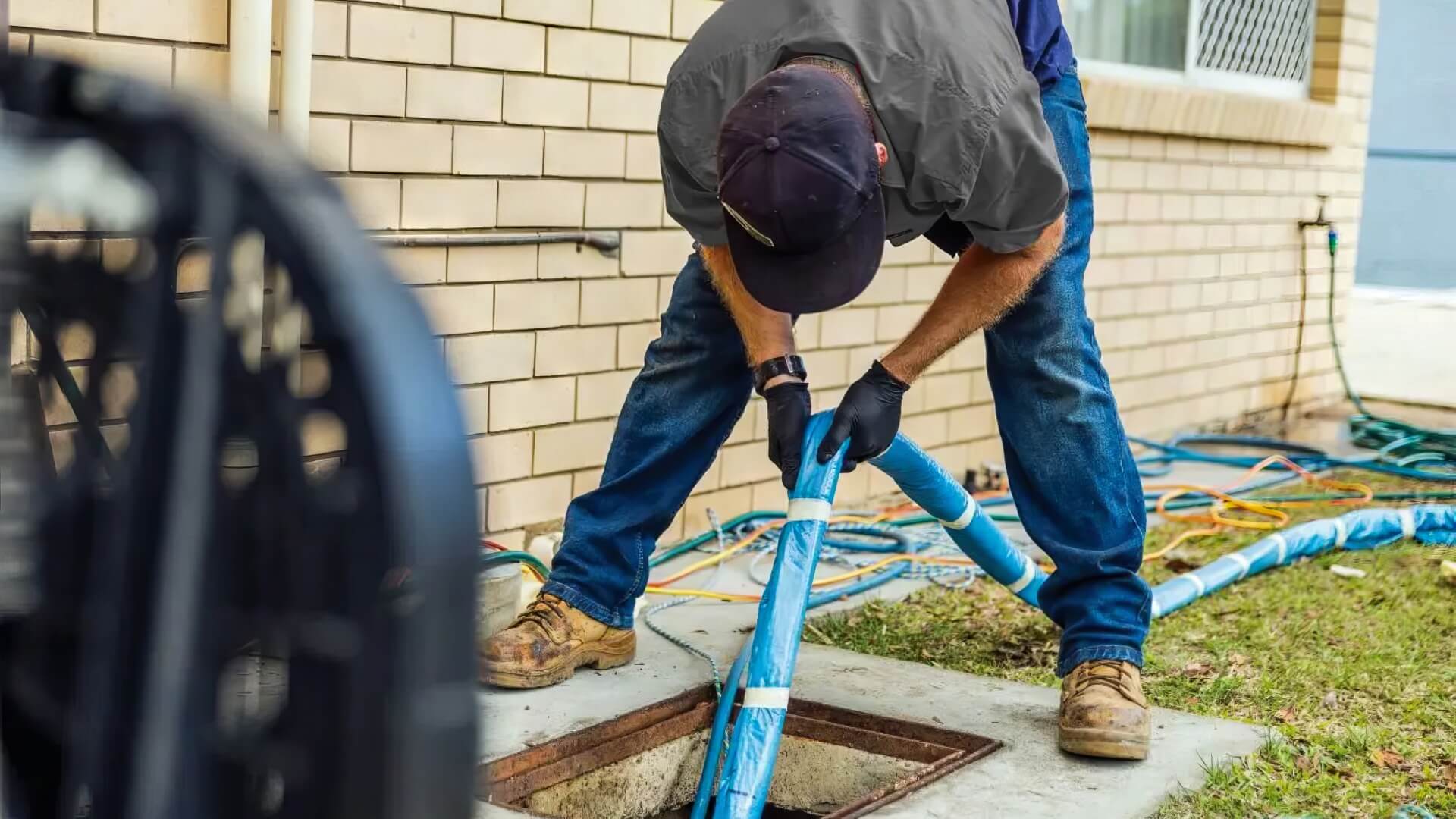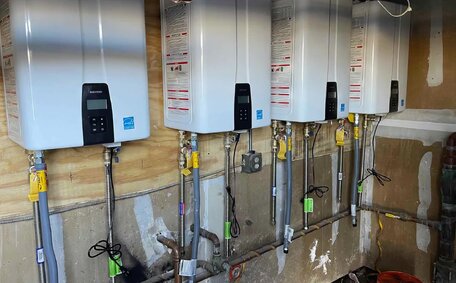Introduction: The risks and hazards of ignoring blocked drains
Blocked drains are a common plumbing issue that can quickly become hazardous if left unattended.
At Colyton Plumbing, located in Colyton, Sydney, we caution homeowners about the risks of ignoring clogged or blocked drains. When debris, grease, or tree roots block drainage pipes, water and waste can back up, leading to property damage, health hazards, and expensive repairs.
Letting a blocked drain go unresolved allows contaminants to accumulate and breeds bacteria. Eventually, the drain may burst from the pressure, flooding the home and yard with raw sewage. Beyond health concerns, the costs to fix flood damage, replace water-logged materials, and repair your plumbing system can be significant.
Standing water also attracts pests and creates foul odours. This can spread dangerous diseases like E. coli, salmonella, or hepatitis A through contact or contaminated drinking water.
Routine maintenance, like having your drains professionally cleaned, keeps flow free of obstructions.
But if you notice gurgling sounds, pooling water, or slow drainage, have your blocked drains inspected immediately. Our skilled technicians at Colyton Plumbing use state-of-the-art equipment to clear blockages and get your pipes flowing freely again. Don’t wait until it’s too late - contact us today to stop small drain issues from becoming costly plumbing emergencies down the line.
Health risks from sewage backups
Raw sewage backing up into your home due to a blocked drain presents serious health hazards. Contact with raw sewage can lead to gastrointestinal issues like vomiting, diarrhoea, and nausea. coli, salmonella, hepatitis A virus, and noroviruses are commonly found in wastewater. Other infections like typhoid fever, dysentery, and hepatitis are also possible.
Contaminants like E.
Sewage contains high levels of bacteria that can be absorbed through the skin, inhaled as bioaerosols, or ingested accidentally. Children, the elderly, and those with weakened immune systems are most at risk of developing severe illness from sewage exposure. Viruses causing hepatitis or polio may persist on surfaces for weeks or months after contamination.
Beyond the risk of infectious diseases, the noxious gases released from sewage backups also pose a health hazard. Hydrogen sulphide and methane can cause headaches, irritate eyes and skin, and make breathing difficult for some individuals. The putrid stench itself can make dwellings uninhabitable.
Sewage backups must be remediated carefully to sanitise all affected materials and prevent mould growth. But extensive structural repairs are often needed to undo the damage. Ignoring a blocked drain leads to exponentially higher costs, health complications, and safety issues in the long run.
Disease and infection from standing water and bacteria
When drains are blocked, water can pool and become stagnant. This standing water becomes a breeding ground for dangerous bacteria, viruses, and mould.
Stagnant water allows Escherichia coli (E. coli), Salmonella, Shigella, Hepatitis A, giardia intestinalis, and other pathogens to multiply rapidly. These bacteria and viruses can cause gastrointestinal illnesses if ingested, leading to symptoms like nausea, vomiting, diarrhoea, and fever.
As well as being ingested, disease-causing pathogens can also enter through open wounds or be absorbed through the skin. Mould spores airborne over standing water may be inhaled and lead to respiratory issues.
Ignoring a blocked drain allows this bacteria-laden water to accumulate and increases the chances of coming into contact with these hazardous microorganisms. Timely drain servicing removes blockages and restores free flow before dangerous pathogens can propagate in the stagnant water.
Toxic mold growth
Blocked drains can lead to leaks and water accumulation inside walls, under floors, and other unseen areas in the home. This persistent moisture allows toxic moulds like black mould, aspergillus, and stachybotrys to proliferate.
These harmful moulds release mycotoxins that can cause respiratory issues like wheezing, asthma attacks, and irritated nasal passages or sinuses when inhaled. Headaches, sore throat, and eye irritation are other common symptoms.
Mould spores also trigger allergic reactions in some people. Those with compromised immune systems may develop fungal infections in their lungs if exposed. Pets are also vulnerable to mould-related illness.
Toxic mould thrives out of sight, so you may be unaware of extensive growth until you notice symptoms. But leaving a blocked drain unattended almost guarantees costly mould remediation down the road. Preventing backups through drain cleaning keeps moisture in check and your living space mould-free.
Property damage from flooding
Ignoring a blocked drain allows water pressure to increase until pipes burst or seams split. Any materials absorbed by the water will likely need replacement - like sodden carpets, drywall, or personal possessions. Ignoring a blocked drain allows water pressure to increase until pipes burst or seams split.
This can lead to catastrophic flooding and resultant water damage.
interior flooding destroying walls, flooring, and furnishings, exterior flooding from a blocked drain can damage the surrounding landscape. Foul, debris-filled water ruining gardens, lawns, pathways, driveways, and outdoor structures. Floodwater often becomes contaminated with sewage, chemicals, oils and requires specialised cleaning.
The repair costs after a sewage-flooded property can quickly escalate into tens of thousands of dollars. Remediating water damage, replacing soaked materials, fixing broken plumbing and cleaning up afterwards takes time and labour too.
Regular maintenance to clear grease, soap residue and other gunk causing blockages can prevent backups and save money in the long run.
Structural damage from water leakage
Ignoring a blocked drain allows water to accumulate and exert hydraulic pressure on pipes and joints. Leaking water, even in small amounts over time, can cause extensive damage to structures.
Persistent moisture in walls and foundations leads to swelling, warping, cracking and erosion. Prolonged leakage rots wooden studs and sheathing, corrodes metal pipes and fittings, degrades concrete and masonry, and deteriorates insulation.
Waterlogged materials become heavier and impose added weight on structural members. This stresses connections and bearing surfaces leading to displacements or collapse. Flooded crawl spaces also undermine ground stability.
If unaddressed, chronic leakage from blocked drains saturates the building envelope and degrades load-bearing members. Seeking prompt drain servicing at first signs of blockage prevents needless deterioration and structural issues down the road.
Warped floors and waterlogged walls
Ignoring a blocked drain allows water to infiltrate underneath floors and inside walls undetected. Over time, chronic moisture exposure causes extensive damage to these structural elements in your home.
Saturated carpet and padding expand, bubble up and come unglued from the subfloor.
Hardwood planks swell, buckle and rot, necessitating full replacement. Moisture wicks up porous masonry walls, leaving telltale water stains. Hardwood planks swell, buckle and rot, necessitating full replacement.
Trapped moisture also nurtures toxic mould growth on wall cavities and wooden framing. This can spread spores and mustiness to other areas. Waterlogged wood studs rot and attract termites while wet insulation loses its thermal resistance.
These impacts weaken floors and walls, requiring expensive tear-out, re-building and mitigation. But staying vigilant to any signs of drain blockage lets you address issues early, before leakage damages your home’s structural integrity.
Damage to home utilities
Blocked drains can damage home utilities in several ways. It also fouls HVAC equipment, limiting airflow and causing mould growth in ductwork.
Sewage backing up can corrode and clog fuel lines, flooding electrical systems and creating a fire hazard. Appliances like water heaters, furnaces, and AC condenser coils rust and short circuit when submerged.
Standing water from blocked drains also seeps into sump pumps, well systems, and septic tanks.
This can burn out motors, jam float switches, or make systems inoperable. Additionally, leaking sewage contaminates potable water lines and groundwater. Tree roots infiltrating cracked pipes restrict water flow to fixtures.
Restoring functionality requires clearing blockages, sanitising, and replacing damaged utility components. But preventing backups through vigilant drain maintenance is more cost-effective. We recommend professional drain cleaning every year so small clogs don’t turn into utility destruction and safety hazards down the road.
Preventing blocked drains
Preventing blocked drains starts with mindful sink and drain usage. Preventing blocked drains starts with mindful sink and drain usage. Alternatively, collect grease in used cans and discard in the trash.
Avoid pouring fats, oils, and grease down the drain - these accumulate and clog pipes. Use drain strainers in sinks and tubs to catch hair, food scraps, and other debris before they wash down the pipes.
Clean clogged drains right away using a plunger, drain snake, baking soda and vinegar, or enzymatic drain cleaner. Installing screens on overflow drains stops larger objects from entering the main drain. Minimise use of garbage disposals as they contribute food particles over time.
Don’t let water pool.
Have drains professionally inspected and cleaned annually. A maintenance cleaning clears built-up gunk before major blockages occur. Our technicians at Colyton Plumbing use high-pressure water jets and specialised tools to keep drains free of obstructions so you can avoid plumbing disasters down the line.
Regular drain maintenance
Having your drains professionally inspected and cleaned on a regular basis is crucial to prevent blockages. We recommend scheduling annual drain maintenance with a licenced plumber like Colyton Plumbing. Our technicians use specialised equipment to thoroughly clear your drains of the grease, soap scum, hair, and other debris that accumulate over time.
An experienced plumber will begin by running a drain camera inspection to identify any trouble spots or obstructions developing in your pipes.
Then high-pressure water jets are used to scour the pipe interior and wash away built-up gunk. Any stubborn clogs can be cleared with Drain King snakes fitted with cutting heads to grind through obstructions.
clearing current blockages, preventative maintenance keeps drains free-flowing by removing accumulating residues before they can harden and cause major stoppages. Allowing a full year between regular professional cleanings gives adequate time for problem buildup to occur. Contact Colyton Plumbing to schedule affordable and effective drain maintenance on an annual basis.
When to call a professional plumber
Calling a professional plumber is advisable as soon as you notice signs of a drain blockage or other plumbing issues in your home. Clogged drains won’t fix themselves, and delaying help can turn a minor clog into a messy, expensive emergency.
Warning signs that indicate it’s time to phone a plumber include: gurgling sounds from pipes as water drains; sinks, tubs or toilets that are slow to drain; foul sewage odours coming from drains; pooling water around floor drains; leaking pipes; low water pressure; and toilets, sinks or tubs that won’t drain at all.
Our team at Colyton Plumbing have the expertise to diagnose and fix any plumbing problem. We use state-of-the-art drain cleaning tools to clear blockages and get your home’s plumbing flowing freely again.
Don’t wait until problems escalate - call us as soon as you notice draining issues so we can prevent more serious property damage and health hazards.
Conclusion
Neglecting a blocked drain allows minor clogs to become major headaches. Standing water breeds disease, causes extensive property damage, and leads to expensive repairs. But diligent drain maintenance keeps plumbing flowing freely and your home safe. Neglecting a blocked drain allows minor clogs to become major headaches. We have the tools and expertise to unclog drains, prevent backups, and avoid the costly consequences.
Don’t wait until it’s too late - regular drain servicing is well worth the investment to protect health, home, and finances.






